牛津高一英语语法复习
牛津高中英语语法复习大全24页(最新整理)
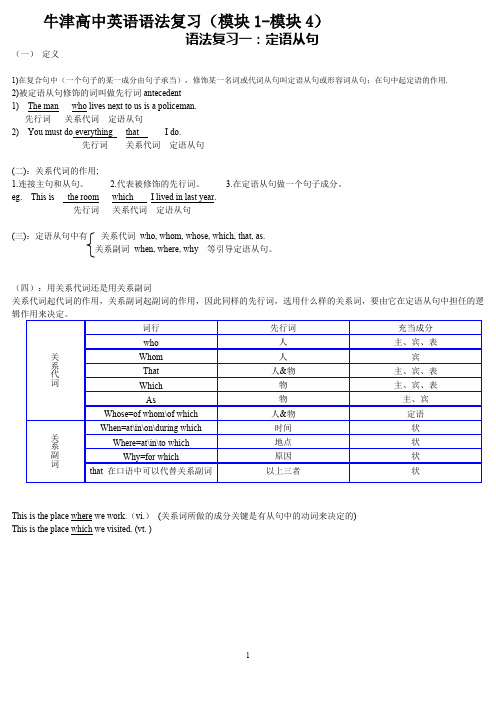
指物 which (that)
指物 which
人和物 whose
人和物的 whose
关系代词在从句中作宾语时可 关系代词一般不可省
以省去
从句只修饰一个名词或代词 可以修饰一个名词或代词也可修饰整个主句
定语从句译在被修饰词的前面 定语从句通常被译成另一个独立的句子
限制性
非限制性
无逗号
有逗号
先行词不是唯一的
注:先行词是 time, minute, moment, next time 很少用关系副词 when,可用 that 但通常省去。
地点
where This is the room where he put up for the 在定语从句中作地点状语 night. 这就是他渡过夜晚的那房子。
原因 why I know the reason why she studies so well . 在定语从句中作原因状语
He has a brother who is a physicist. He has a brother, who is a physicist. (只有一个) He returned all the books which are written in English. He returned all the books, which are written in English.
Why=for which
原因
状
词
that 在口语中可以代替关系副词
以上三者
状
This is the place where we work.(vi.) (关系词所做的成分关键是有从句中的动词来决定的) This is the place which we visited. (vt. )
Unit 3 Grammar 讲义-高一英语牛津译林版(2020)必修第一册
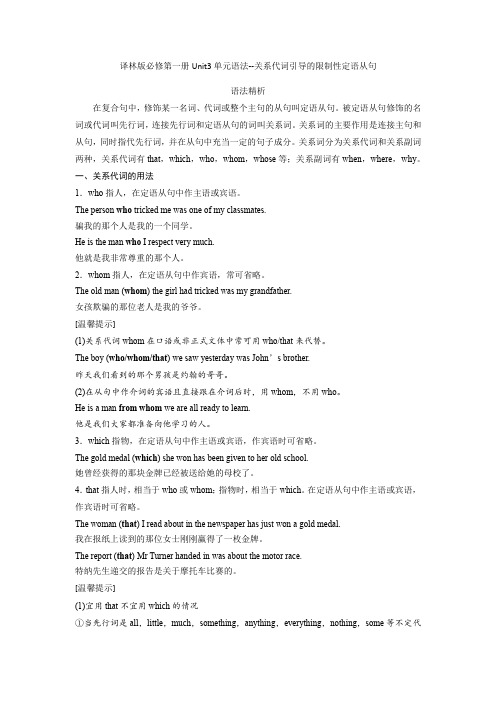
译林版必修第一册Unit3单元语法--关系代词引导的限制性定语从句语法精析在复合句中,修饰某一名词、代词或整个主句的从句叫定语从句。
被定语从句修饰的名词或代词叫先行词,连接先行词和定语从句的词叫关系词。
关系词的主要作用是连接主句和从句,同时指代先行词,并在从句中充当一定的句子成分。
关系词分为关系代词和关系副词两种,关系代词有that,which,who,whom,whose等;关系副词有when,where,why。
一、关系代词的用法1.who指人,在定语从句中作主语或宾语。
The person who tricked me was one of my classmates.骗我的那个人是我的一个同学。
He is the man who I respect very much.他就是我非常尊重的那个人。
2.whom指人,在定语从句中作宾语,常可省略。
The old man (whom) the girl had tricked was my grandfather.女孩欺骗的那位老人是我的爷爷。
[温馨提示](1)关系代词whom在口语或非正式文体中常可用who/that来代替。
The boy (who/whom/that) we saw yesterday was John’s brother.昨天我们看到的那个男孩是约翰的哥哥。
(2)在从句中作介词的宾语且直接跟在介词后时,用whom,不用who。
He is a man from whom we are all ready to learn.他是我们大家都准备向他学习的人。
3.which指物,在定语从句中作主语或宾语,作宾语时可省略。
The gold medal (which) she won has been given to her old school.她曾经获得的那块金牌已经被送给她的母校了。
4.that指人时,相当于who或whom;指物时,相当于which。
牛津版牛津高中英语语法总结(权威)
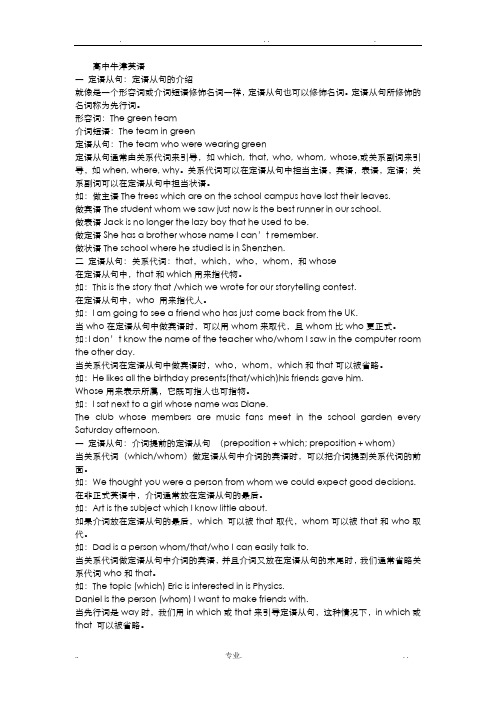
高中牛津英语一定语从句:定语从句的介绍就像是一个形容词或介词短语修饰名词一样,定语从句也可以修饰名词。
定语从句所修饰的名词称为先行词。
形容词:The green team介词短语:The team in green定语从句:The team who were wearing green定语从句通常由关系代词来引导,如which, that, who, whom, whose,或关系副词来引导,如when, where, why。
关系代词可以在定语从句中担当主语,宾语,表语,定语;关系副词可以在定语从句中担当状语。
如:做主语The trees which are on the school campus have lost their leaves.做宾语The student whom we saw just now is the best runner in our school.做表语Jack is no longer the lazy boy that he used to be.做定语She has a brother whose name I can’t remembe r.做状语The school where he studied is in Shenzhen.二定语从句:关系代词:that,which,who,whom,和whose在定语从句中,that和which用来指代物。
如:This is the story that /which we wrote for our storytelling contest.在定语从句中,who 用来指代人。
如:I am going to see a friend who has just come back from the UK.当who在定语从句中做宾语时,可以用whom来取代,且whom比who更正式。
如:I don’t know the name of the teacher who/whom I saw in the computer room the other day.当关系代词在定语从句中做宾语时,who,whom,which和that可以被省略。
高中牛津英语语法大全精心整理版
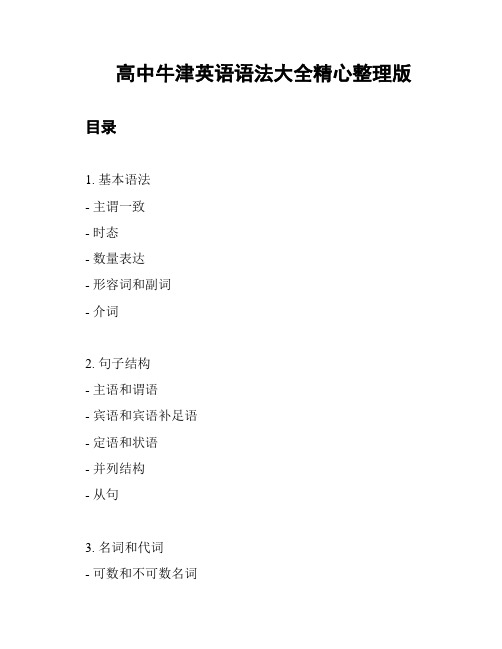
高中牛津英语语法大全精心整理版目录1. 基本语法- 主谓一致- 时态- 数量表达- 形容词和副词- 介词2. 句子结构- 主语和谓语- 宾语和宾语补足语- 定语和状语- 并列结构- 从句3. 名词和代词- 可数和不可数名词- 名词所有格- 代词的分类和用法- 反身代词4. 动词和动词短语- 动词的时态和语态- 动词的非谓语形式- 动词的一般和不定式- 动词短语5. 形容词和副词- 形容词的比较等级- 副词的比较等级- 形容词和副词的用法6. 介词和介词短语- 常见介词- 介词的用法7. 连词和连接词- 连接句子的连词- 连接词、短语和从句- 引导让步和条件从句8. 时间和条件状语从句- 时间状语从句- 条件状语从句- 原因状语从句- 目的和结果状语从句9. 直接引语和间接引语- 直接引语的引用和标点- 间接引语的转述- 引语中的时态转换10. 被动语态和虚拟语气- 被动语态- 虚拟语气11. 固定句型和常用表达- 常用固定句型- 常用表达简介本文档是针对高中英语语法的精心整理,主要内容涵盖了基本语法、句子结构、名词和代词、动词和动词短语、形容词和副词、介词和介词短语、连词和连接词、时间和条件状语从句、直接引语和间接引语、被动语态和虚拟语气、固定句型和常用表达等方面的知识点。
每个主要部分都包括了相应的子部分,帮助读者全面理解和掌握英语语法知识。
该文档旨在提供简洁、易懂的内容,避免使用过于复杂的法律术语和相关引用,以确保读者能够轻松阅读并有效学习英语语法。
牛津版教材高一语法知识点

牛津版教材高一语法知识点牛津版教材是一套广泛使用于高中英语教学中的教材系列。
其旨在帮助学生打下坚实的英语基础,其中也包括了丰富的语法知识点。
在本文中,我们将就牛津版教材高一语法知识点进行探讨。
一、时态的综合掌握时态是英语语法中的重要部分,掌握不同时态的用法可以帮助我们准确地表达过去、现在和将来的动作或状态。
在牛津版高一教材中,包括了一些常见时态,如一般现在时、一般过去时、现在进行时、过去进行时、一般将来时等。
通过多种练习题,学生可以进一步巩固这些时态的用法。
例如,在学习一般现在时时,我们会了解到它表示现阶段的常规或习惯性动作,还可以用于表示客观真理或普遍事实。
在具体的实例中,学生可以通过与老师和同学进行对话,描述自己的日常生活、学校规则、个人喜好等来练习运用这一时态。
二、名词的用法与变化名词是我们日常交流中必不可少的一部分,它用于描述人、事、物或概念等。
在牛津版高一教材中,学生将学习名词的用法和变化,例如单数到复数的转变、可数名词与不可数名词的区别等。
在学习单数到复数转变时,学生需要掌握一些常见变化规则,如在名词末尾加 -s 或 -es,如 book - books, box - boxes。
此外,还有一些特殊的变化规则,如以辅音字母+y结尾的名词变复数时,将 y 改为 i,再加 -es,如 city - cities,lady - ladies。
三、形容词与副词的正确用法形容词和副词是用来修饰名词或动词的词性。
在牛津版高一教材中,形容词和副词的用法以及比较级和最高级的变化规则也是重要内容之一。
形容词的用法包括修饰名词、构成名词词组、作定语、宾补等。
例如,在描述某个人或物时,我们可以使用形容词来增强描述的程度,如 tall boy, beautiful flowers。
副词的用法包括修饰动词、形容词、其他副词等。
例如,在描述某个动作时,我们可以使用副词来表达动作的方式、频率等,如 quickly run, often read。
专题04 重点语法复习:不定式作定语和结果状语-高一英语下考点大串讲(牛津译林版2020)(解析版)

专题04重点语法复习:不定式作定语和结果状语▲动词不定式作定语动词不定式由“to+动词原形”构成。
这里的to是不定式标志,没有词义。
动词不定式作定语常用来修饰名词或不定代词,放于所修饰的词后,为后置定语。
这类名词有chance,way,opportunity,right(权利),dream,ambition,time,power,ability,attempt,promise,wish, plan,decision,tendency,failure等。
I am so busy that I have no time to inform him of the incident in detail.我是如此忙以至于我没有时间详细地告诉他这个事情。
【名师点津】(1)如果不定式的动词与被修饰词之间有逻辑上的动宾关系,并且该动词是不及物动词,则需要加上适当的介词或副词与前面的名词相呼应。
但place,time,way后不定式的介词常省略。
The Browns have a comfortable house to live in.布朗一家有一幢舒适的房子可以居住。
The old man is looking for a quiet place to live.那位老人正在找一个安静的地方住。
(2)序数词后常用不定式作后置定语。
Yang Yang is the first Chinese athlete to win a gold medal in the Winter Olympics.杨扬是中国第一个在冬奥会上获得金牌的运动员。
▲动词不定式作结果状语1.动词不定式表示结果时,其逻辑主语就是句子的主语。
结果状语常常只限于learn(得知),find(发现),see,hear,to be told(被告知),make(使得),turn out to be等具有界限含义的动词。
He returned home to learn his daughter had just been rescued.他回家后得知女儿刚刚被救了。
牛津译林版高一英语上册必修一 语法总结
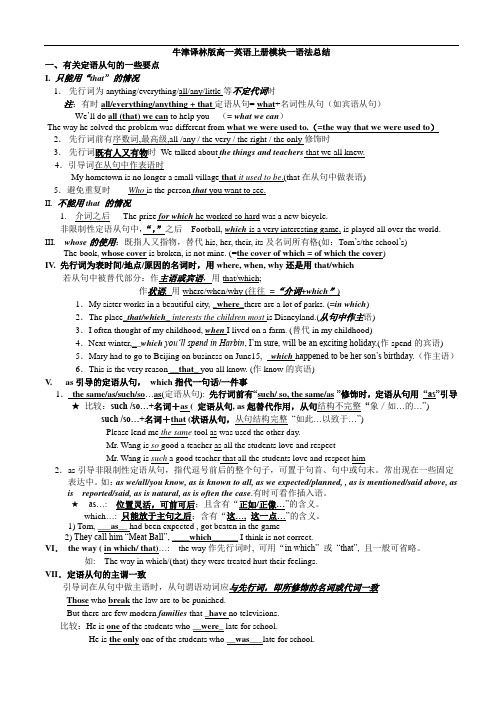
牛津译林版高一英语上册模块一语法总结一、有关定语从句的一些要点I. 只能用“that”的情况1.先行词为anything/everything/all/any/little等不定代词时注:有时all/everything/anything + that定语从句= what+名词性从句(如宾语从句)We’ll do all (that) we can to help you (= what we can)The way he solved the problem was different from what we were used to.(=the way that we were used to)2.先行词前有序数词,最高级,all /any / the very / the right / the only修饰时3.先行词既有人又有物时We talked about the things and teachers that we all knew.4.引导词在从句中作表语时My hometown is no longer a small village that it used to be.(that在从句中做表语)5.避免重复时Who is the person that you want to see.II. 不能用that 的情况1.介词之后The prize for which he worked so hard was a new bicycle.非限制性定语从句中,“,”之后Football,which is a very interesting game, is played all over the world. III. whose的使用:既指人又指物,替代his, her, their, its及名词所有格(如:Tom’s/the school’s) The book, whose cover is broken, is not mine. (=the cover of which = of which the cover)IV. 先行词为表时间/地点/原因的名词时,用where, when, why还是用that/which若从句中被替代部分:作主语或宾语,用that/which;作状语, 用where/when/why (往往=“介词+which”)1.My sister works in a beautiful city, _where_there are a lot of parks. (=in which)2.The place_that/which_ interests the children most is Disneyland.(从句中作主语)3.I often thought of my childhood, when I lived on a farm. (替代in my childhood)4.Next winter,__which you’ll spend in Harbin, I’m sure, will be an exciting holiday.(作spend的宾语)5.Mary had to go to Beijing on business on June15, which h appened to be her son’s birthday.(作主语)6.This is the very reason __that_ you all know. (作know的宾语)V. as引导的定语从句,which指代一句话/一件事1.the same/as/such/so…as(定语从句):先行词前有“such/ so, the same/as ”修饰时,定语从句用“as”引导★比较:such /so…+名词+as ( 定语从句, as起替代作用,从句结构不完整“象/如…的…”) such /so…+名词+that (状语从句,从句结构完整“如此…以致于…”)Please lend me the same tool as was used the other day.Mr. Wang is so good a teacher as all the students love and respectMr. Wang is such a good teacher that all the students love and respect him 2.as引导非限制性定语从句,指代逗号前后的整个句子,可置于句首、句中或句末。
牛津版高一英语模块一Units1-3知识点及语法复习
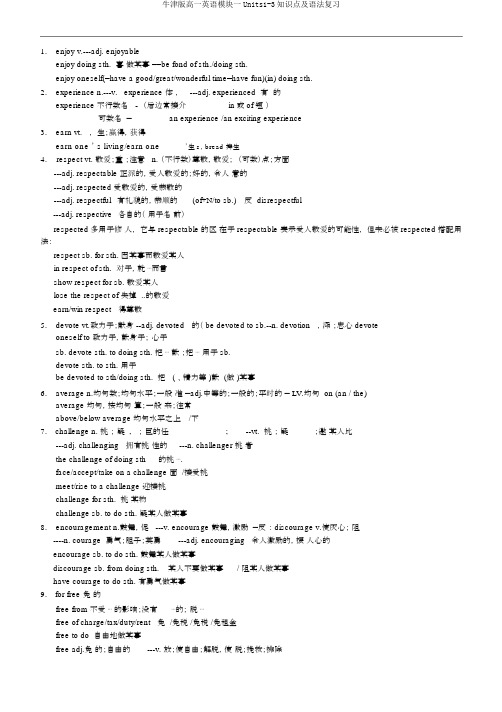
1.enjoy v.---adj. enjoyableenjoy doing sth. 喜做某事 ==be fond of sth./doing sth.enjoy oneself(=have a good/great/wonderful time=have fun)(in) doing sth.2.experience n.---v. experience 体, ---adj. experienced 有的experience 不行数名 -(后边常接介in 或 of 短)可数名—an experience /an exciting experience3.earn vt. ,生;赢得,获得earn one ’ s living/earn one’生s,bread持生4.respect vt. 敬爱;重;注意 n. (不行数)尊敬,敬爱;(可数)点;方面---adj. respectable 正派的,受人敬爱的;好的,令人意的---adj. respected 受敬爱的,受恭敬的---adj. respectful有礼貌的,恭顺的(of+N/to sb.)反disrespectful---adj. respective各自的(用于名前)respected多用于修人,它与 respectable的区在于 respectable 表示受人敬爱的可能性,但未必被 respected 搭配用法:respect sb. for sth. 因某事而敬爱某人in respect of sth. 对于,就⋯而言show respect for sb. 敬爱某人lose the respect of 失掉 ..的敬爱earn/win respect 得尊敬5.devote vt.致力于;献身 --adj. devoted 的( be devoted to sb.--n. devotion ,深;忠心 devoteoneself to 致力于,献身于;心于sb. devote sth. to doing sth. 把⋯献;把⋯用于 sb.devote sth. to sth. 用于be devoted to sth/doing sth. 把 (、精力等 )献 (做 )某事6.average n.均匀数;均匀水平;一般准—adj.中等的;一般的;平时的— LV.均匀 on (an / the)average 均匀,按均匀算;一般来;往常above/below average 均匀水平之上/下7. challenge n. 挑;疑 , ;巨的任;--vt. 挑;疑;邀某人比---adj. challenging拥有挑性的---n. challenger 挑者the challenge of doing sth的挑⋯.face/accept/take on a challenge 面 /接受挑meet/rise to a challenge 迎接挑challenge for sth. 挑某物challenge sb. to do sth.疑某人做某事8.encouragement n.鼓舞,促 ---v. encourage 鼓舞,激励—反: discourage v.使灰心;阻----n. courage 勇气;胆子;英勇---adj. encouraging令人激励的,振人心的encourage sb. to do sth. 鼓舞某人做某事discourage sb. from doing sth.某人不要做某事/阻某人做某事have courage to do sth. 有勇气做某事9. for free 免的free from 不受⋯的影响;没有⋯的;脱⋯free of charge/tax/duty/rent免/免税/免税/免租金free to do 自由地做某事free adj.免的;自由的---v.放;使自由;解脱,使脱;挽救;排除---adv. freely 自由地,不受限制地;通地---n. freedom 自由;自主10. look back on/upon sth.回,回look back on/upon the past 回顾去look back on/upon those years 回顾那些年look into;察look on 旁;,look out 注意,当心;注意看look up 找;好;向上看;敬爱;拜look down on/upon ,看不起look through ;仔看;而不look after 照;照看look for找look forward to (doing sth.)期望,期望look about 四看;观察事(1)As look back upon those years , I am struck by Annie's wisdom.< 回,回忆 >( 2)I've been looking into this matter this afternoon.<>( 3)Two men were fighting. The rest were looking on.< 旁 >(4)When you're eating fish , look out for bones.< 当心,当心 >(5)We've been looking out for a new house , but the ones we've seen are all too expensive.<留意找某物 >(6)Look up the word in the dictionary< ,找 >(7)I want to look my uncle up sometime.< 探望,拜 >(8)She looked through her notes before the examination.<>11. satisfaction n. 意— v. satisfy 使某人意;足要求等;切合准等---adj. satisfied 意的,足的反: dissatisfied---adj. satisfying令人高的,令人意的反: unsatisfying,物体,做主,一般极少用---adj. satisfactory 意的,好的,反: unsatisfactory ,常用,表示事物自己拥有的特色等be satisfied with sb./sth.⋯感觉意with/in satisfaction足地,意地to sb.’ s satisfaction使某人意express satisfaction with/at sth.⋯表示意give sb. the satisfaction of doing sth.使某人获得做某事的足感get/gain satisfaction from sth. 从某事物中获得足感12.exchange v.交,沟通,,更exchange sth. for sth.用某物某物exchange sth. with sb. 同某人交 /沟通某物in exchange for交13. What is⋯like?用于提某人或某物的状况怎么。
- 1、下载文档前请自行甄别文档内容的完整性,平台不提供额外的编辑、内容补充、找答案等附加服务。
- 2、"仅部分预览"的文档,不可在线预览部分如存在完整性等问题,可反馈申请退款(可完整预览的文档不适用该条件!)。
- 3、如文档侵犯您的权益,请联系客服反馈,我们会尽快为您处理(人工客服工作时间:9:00-18:30)。
牛津高中英语语法复习(模块1-4)语法经典练习:1. He ______ you more help, even though he was very busy.A. might have givenB. might giveC. may have givenD. may give2. Jenny______ have kept her word. I wonder why she changed her mind.A. mustB. shouldC. needD. would3. . -Could I borrow your dictionary-Yes, of course you_________A. mightB. willC. canD. should4. I told Sally how to get here, but perhaps I ______ for her.A. had to write it outB. must have written it outC. should have written it outD. ought to write it out5. —Shall I tell John about it?—No, you ______ . I've told him already.A. needn'tB. wouldn'tC. mustn'tD. shouldn't6. ─There were already five people in the car but they managed to take me as well.─ It______ a comfortable journey.A. can't beB. shouldn't beC. mustn't have beenD. couldn't have been7. It's nearly seven o'clock. Jack______ be here at any moment.A. mustB. needC. shouldD. can8. .When he was there, he______ go to that coffee shop at the corner after workevery day.A. wouldB. shouldC. had betterD. might9. .Sir, you _____ be sitting in this waiting room. It is for women and children only.A. oughtn't toB. can'tC. won'tD. needn't10. The fire spread through the hotel very quickly but everyone ______ get out.A. had toB. wouldC. couldD. was able to11. --When can I come for the photos I need them tomorrow afternoon.--They _____be ready by 12:00.A. canB. shouldC. mightD. need12. .--I stayed at a hotel while in New York.--Oh, did you You_ ____with Barbara.A. could have stayedB. could stayC. would stayD. must have stayed13. -Will you stay for lunch?-Sorry,_____ ,My brother is coming to see me.A. I mustn't can't C. I needn't won't14. Sorry I'm late. I ______ have turned off the alarm clock and gone back to sleep again.A. mightB. shouldC. canD. will15. I should have been there, but I _______ not find the time.A. wouldB. couldC. mightD. should16. My sister met him at the Grand Theatre yesterday afternoon, so he ___ your lecture.A. couldn't have attendedB. needn't have attendedC. mustn't have attendedD. shouldn't have attended17. --- Are you coming to Jeff's party?--- I'm not sure. I ________go to the concert instead.A.must B.would C.should D.might18. Mr. Bush is on time for everything. How _________ it be that he was late for the opening ceremony?A.can B.should C.may D.must19 He hesitated for a moment before kicking the ball, otherwise he ________ a goal.A.had scored B.scoredC.would score D.would have scored20. —Write to me when you get home.—_________A.I must B.I should C.I will D.I can21. I was really anxious about you. You _____ home without a word.A. mustn't leaveB. Shouldn't have leftC. Couldn't have leftD. needn't leave22. Oh, I’m not feeling well in the stomach, I______ so much fried chicken just now.A. shouldn’t cutB. mustn’t have eatenC. shouldn’t have eatenD. mustn’t eat23. --I heard they went skiing in the mountains last winter.--It _____ be true because there was little snow there.A may not beB won’t beC couldn’t beD mustn’t be24. It has been announced that candidates_____ remain in their seats until all the papers have been collected.A canB willC mayD shall25. A left-luggage office is a place where bags ______ be lefe for a short time, especially in a railway station.A. shouldB. canC. mustD. will26. --- I don't mind telling you what I know.--- You . I'm not asking you for it.A.mustn'tB. may notC. can'tD. needn’t27. I often see lights in that empty house. Do you think I _____ report it to the policeA. shouldB. mayC. willD. can28. _____ at 8:30 for the meeting, but he didn’t’ show up.A. should have arrivedB. should arriveC. should have had arrivedD. should be arriving29. You ______ be tired - you've only been working for an hour.A. must notB. won' tC. can' tD. may not30. — Who is the girl standing over there— Well , if you know , her name is Mabel.A. mayB. canC. mustD. shallKeys:1-5 ABCCA 6-10 DCAAD11-15 BABAB 16-20 ADADC21-25 BCCDB 26-30 DAACC语法复习六:被动语态语态(Voice),作为一个语法范畴,是表示主语和动词之间的主动或被动关系的动词行式。
英语动词有两种语态:主动语态(Active Voice)和被动语态(Passive Voice)。
当主语为动作执行者即施动者时,动词用主动态;如果主语是动作的承受者即受动者时,动词便用被动态。
例如:(1) John helped Peter.(2) Peter was helped by John.句(1) helped是主动态;句(2)was helped是被动态,可见主动态是无标记的,而被动态是有标记的。
构成被动语态由助动词be的时态之一和及物动词的过去分词构成。
被动语态可用于各种时态,其时态变化通过助动词be的不同形式来体现。
如:一般现在时的被动态构成形式为助动词am/is/are + 过去分词;而一般过去时的被动态构成形式为was/were + 过去分词。
